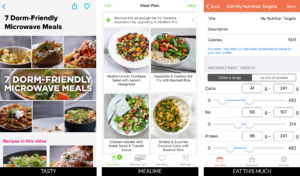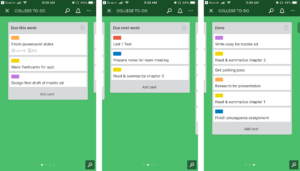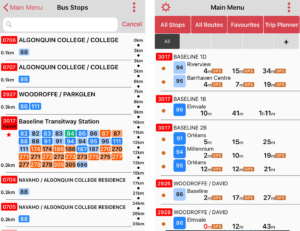How many times a day do you think you check your phone? 50? 100? 200? With the countless distractions and notifications that are constantly popping-up, staying focused on your work and classes requires a lot of self-regulation. This is especially true if you are an online learner. Without anyone around to keep you accountable, it’s a challenge to avoid going down the internet rabbit hole. We’ve got some helpful tricks and tips to help you succeed as an online student.
Establish a schedule

While taking College classes online allows you to have a very flexible schedule, this unstructured time can lead to many challenges. To make things easier, try creating a weekly timetable for yourself like you would have in a real classroom setting. Dedicate certain days to specific classes and budget at least one hour of homework for every hour of class time. Try to spread out activities so you don’t get overwhelmed, and make sure you leave enough room in between for downtime.
Here’s a template you can download to make your timetable and instructions on how to create a weekly schedule using software like Google Calendar or Outlook.
Set blackout periods

Studies show that you can lose up to 40% of your productivity by task-switching. To prevent this, turn phone on Do Not Disturb mode and block distracting websites on your browser to avoid temptations for set periods of time throughout the day. Make sure to be realistic when you set your blackout periods so that you can actually stay committed. For example, tell yourself that after every three hours of studying you will reward yourself with one episode of your favourite Netflix show. If you are too strict with your rules, you are bound to crack and break them.
Find a dedicated study area

Whether it’s a coffee shop, your local library, a home office, or your kitchen table, it’s important to have a designated study area where you feel comfortable with limited distractions and a strong internet connection. Although it is tempting to do work in your bed or on your couch, your “quick power naps” can very easily turn into hour-long slumbers. Instead, pick one room or area to study in and stick with it. Over time, you will get used to the space and you’ll have less new stimuli for your brain to process.
Use a notepad

Taking notes by hand can seem cumbersome, especially when all your courses are on your computer anyways. But just because you can type faster than you can write, doesn’t mean it’s the best alternative. In fact, you will be more likely to absorb the material when you are taking notes by hand and summarizing as you go, rather than typing 100 words a minute and retaining none of it. Studying your handwritten notes can also help reduce the eye strain that results from too much screen time.
Socialize with peers
Just because you are studying online doesn’t mean that you should do it alone. To avoid isolation, try to participate in online discussion groups with other students who are in the same course or program as you. Make a conscious effort to plan activities and get-togethers with friends throughout the week. Socializing will help your brain engage in new ideas and can help reduce stress levels.
More resources
Check out more resources for online learners including our program guide and upcoming info sessions.







